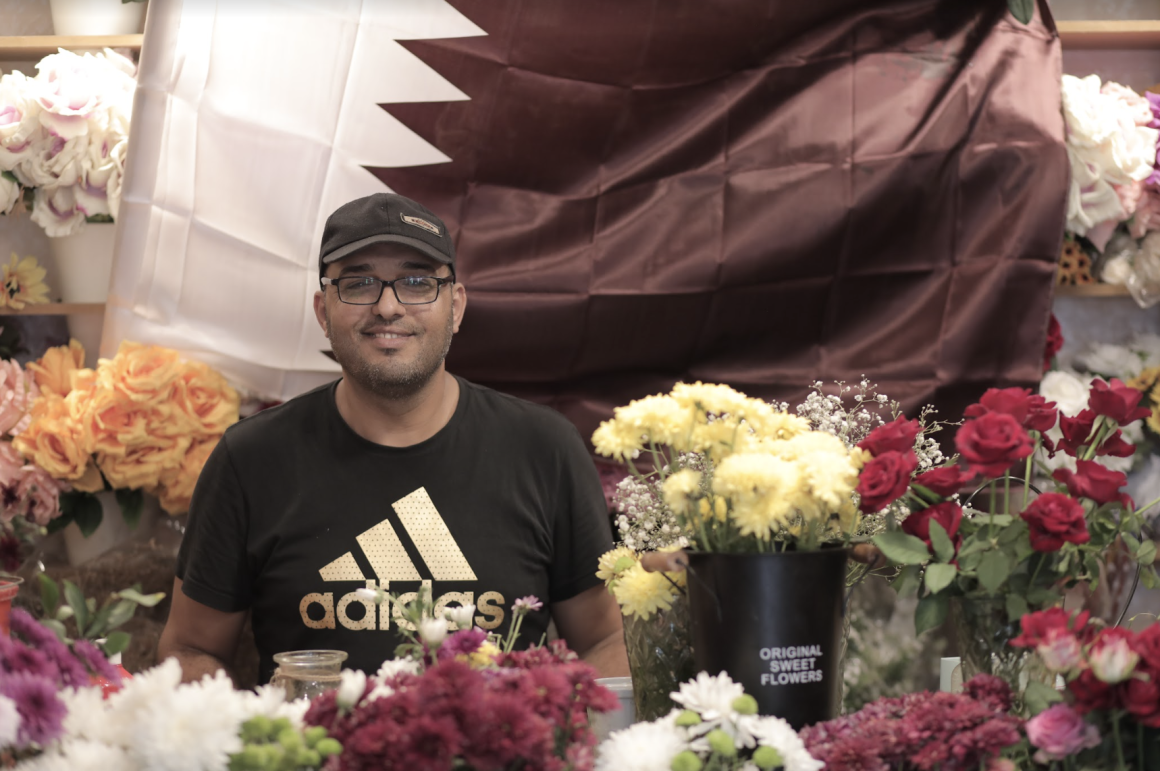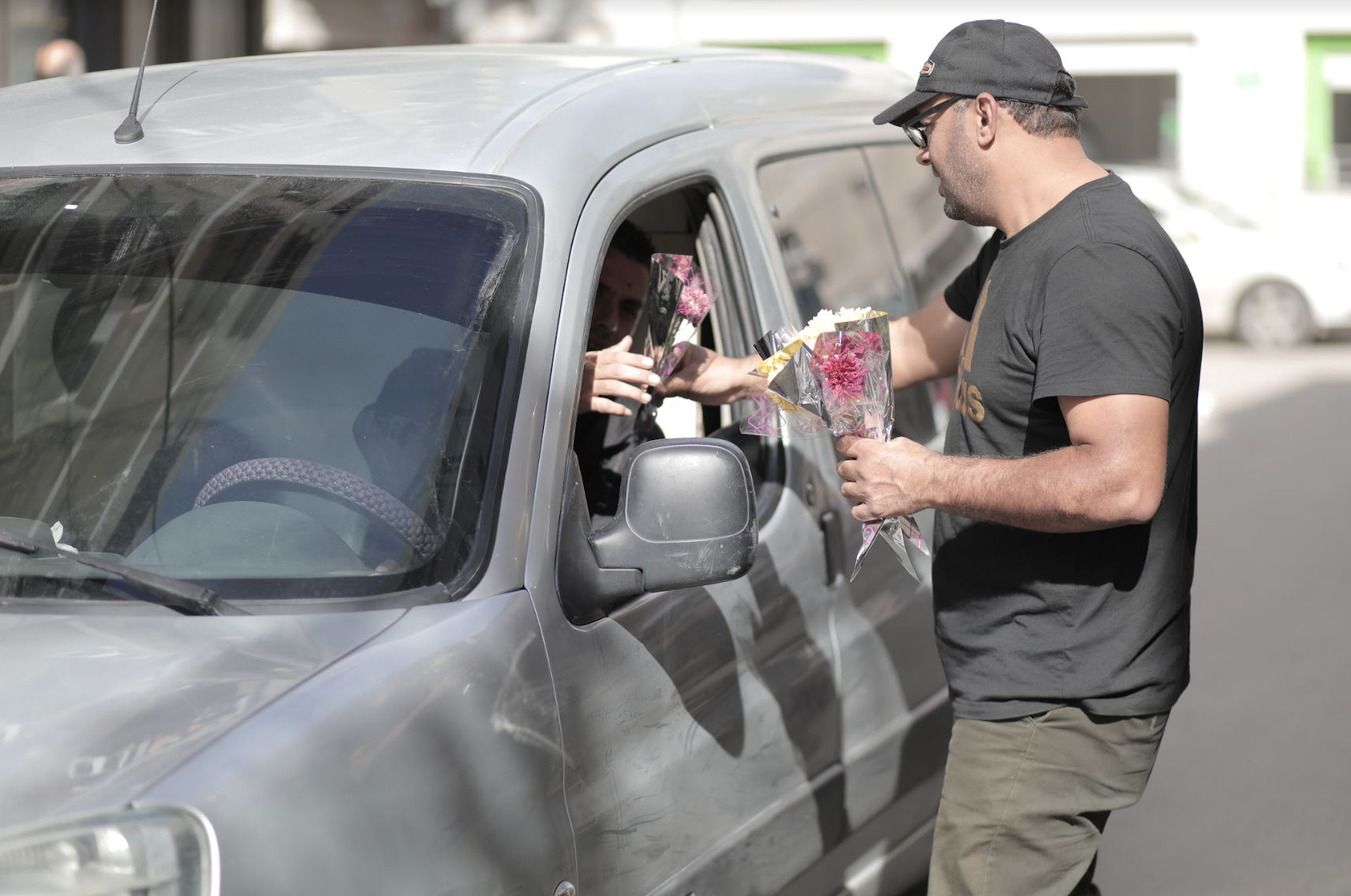In Khan Younis governorate, southern Gaza Strip, people queued up to get free flowers at a florist where Qatari songs played.
Women, children, elderly people, students and taxi drivers were singing, laughing and taking photos and selfies at the store, where Qatari flags were waving.
The store owner Maher Abu Dagga, 45, a big football fan, is delighted that Qatar is hosting the FIFA World Cup 2022.
“I am happy since Qatar is the first Arab country hosts the World Cup. I am so proud that such a small country has succeeded in preparing everything for the World Cup, despite the blockade [it] faced,” he said.
The Kingdom of Saudi Arabia, the United Arab Emirates, Bahrain and Egypt imposed a four-year blockade on Qatar in 2017 after a diplomatic crisis, as they claimed Qatar supports “terrorism”.
“I decided to show my happiness to our Qatari brothers by distributing 30.000 flowers for free to Gazans so that it puts a smile on their faces.”
Maher, a father of four, opened his store in 2000 after graduating from university, as he failed to find a job. His business was booming until Israel imposed a land, sea, and air blockade on Gaza in 2007 after Hamas won the legislative election. Israel has since banned florists from importing their products since 2007.
But Maher managed to keep his business going. “We love life regardless of obstacles, poverty and the consecutive Israeli assaults,” he said.

The florist established a flower nursery in 2016 in Abasan al-Kabira village, in the east of Khan Younis, 500 meters from Israel’s borders.
His nursery was partly damaged in 2018, and he was not compensated by the Hamas-run government. So, he had to repair it at his own expense to keep working.
When Israel launched its 10-day assault on Gaza in 2021, which killed 232 Gazans, including dozens of children, it bombed a land near his nursery, which was significantly damaged, causing tens of thousands of flowers to dry out.
“I lost more than $30,000 in 2021 and had huge debts to revive my business again. I always have to overcome the obstacles I face because I don’t have another source of income,” Maher said, as he was packaging 100 flowers for passersby.
Although his nursery needs solar panels, a water well and maintenance, he decided to express his happiness at Qatar’s breakthrough in his own way.
“The 30,000 flowers took three months to be ready for selling. Their price is 30,000 shekels [$8,645]. But I wanted to show my gratitude for Qatar, which has supported Palestine for a long time,” said Maher.
“Qatar always pays the monthly aid for poor Gazan families, supports the infrastructure, the reconstruction and many vital projects. Whatever we do is a little for them. Qatar is our second home and an unwavering supporter.”
Maher distributed the flowers on Monday, Tuesday and Wednesday. His initiative was widely supported, especially by his wife.
“I was delighted when Maher told me his idea of distributing flowers for Qatar. I couldn’t describe my happiness when I saw elderly people, children and women holding flowers and taking photos at the store; it was like Eid,” Maher’s wife Fedaa Abu Dagga, 35, said, referring to the Islamic holiday.
“It’s such a great honour that an Arab country hosts the World Cup because Western countries always do so. We want to recover our laurels. I hope the other Arab countries do as Qatar has done.”
After Maher finished distributing the flowers, a young woman came to the store asking for free flowers. He generously packed new flowers for her.
“It is an amazing, unique initiative. Palestinians and Qatari people are one nation. I hope Qatar or Palestine win the Cup because both of them are my countries, student Nada Alagha, 22, said while taking free flowers from Maher.
Minutes later, two women came to buy some gifts for a friend. They also asked Maher for free flowers and took a selfie with the Qatari flag before leaving.
Lawyer and activist Terad Foad, 35, urged Maher and other Palestinians to do such initiatives to thank Qatar for her solid support for Palestine.
“Qatar’s hosting the World Cup is a pride for all Arabs and Muslims,” he said.







